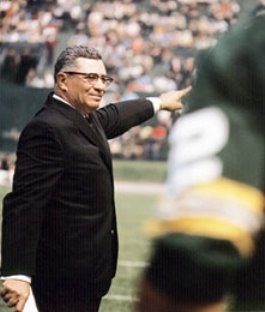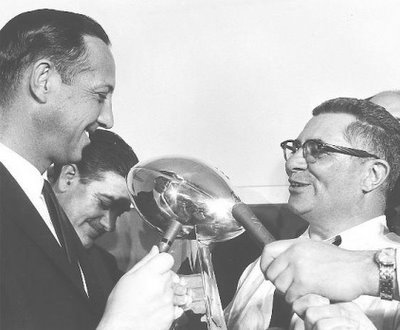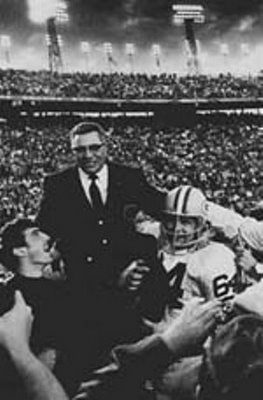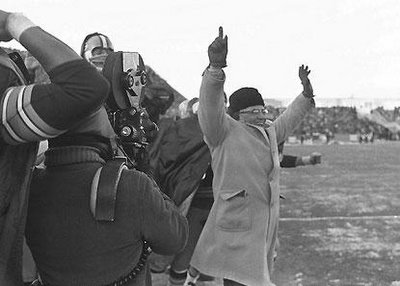
Generally speaking, I don't think the first one is necessarily the best, but it always does have a special significance, by virtue of the fact that it is the first.
On January 15, 1967, the Green Bay Packers won the first Super Bowl, beating the Kansas City Chiefs, 35-10.


The Green Bay Dynasty also took home the Super Bowl II title. After winning their third consecutive NFL Championship, the Pack defeated the Oakland Raiders, 33-14, on January 14, 1968.


Super Bowl II was Vince Lombardi's last game as the head coach of the Packers. It was the last time his players carried him off the field, victorious.
In his nine years at Green Bay, the Glory Years, Coach Lombardi won six Western Conference championships, five NFL championships, and two Super Bowls.
A Glorious Chapter in Packer History
Likable Ray "Scooter" McLean moved up from being an outstanding assistant coach to guide the destiny of the Packers for 1958. McLean resigned in December after a 1-10-1 record, the worst in Packer history in his lone season as head coach.I've always considered it to be an especially fitting tribute to Vince Lombardi that the Super Bowl trophy bears his name.
The Packers took their time after McLean's resignation. [Jack] Vainisi conducted Phase II of the '59 draft by himself, as the team debated whether to hire a general manager as well as a coach, or one person for both positions. The search spanned from the CFL to the college ranks, and even included a GM application from Curly Lambeau.
On. Jan. 28, when team president Dominic Olejniczak recommended to the committee a little-known Giants assistant, longtime committee member John Torinus replied, "Who the hell is Vince Lombardi?"
The committee, and the world, quickly found out. Within hours after his arrival on Feb. 2, Lombardi told the committee, "I want it understood that I am in complete command here." Two days later the Packers officially gave Lombardi both titles.
The Lombardi Trophy, the NFL's most prestigious award, signifies hard work, strong will, character, pride, and dedication to excellence. It embodies not only the skills but also the values that Coach Lombardi instilled in his players.
As Coach Lombardi said, "The quality of a person's life is in direct proportion to their commitment to excellence, regardless of their chosen field of endeavor."
As he did so often, he wasn't just talking about football; he was talking about life.
In perhaps his most famous speech, Coach Lombardi's eloquence goes far beyond the typical rhetoric used to encourage a football team to win a game.
It speaks to the possibilities within every person, encouraging one to strive to achieve and live to the fullest.
Winning is not a sometime thing; it's an all the time thing. You don't win once in a while; you don't do things right once in a while; you do them right all the time. Winning is a habit. Unfortunately, so is losing.
There is no room for second place. There is only one place in my game, and that's first place. I have finished second twice in my time at Green Bay, and I don't ever want to finish second again. There is a second place bowl game, but it is a game for losers played by losers. It is and always has been an American zeal to be first in anything we do, and to win, and to win, and to win.
Every time a football player goes to play his trade he's got to play from the ground up -- from the soles of his feet right up to his head. Every inch of him has to play. Some guys play with their heads. That's O.K. You've got to be smart to be number one in any business. But more importantly, you've got to play with your heart, with every fiber of your body. If you're lucky enough to find a guy with a lot of head and a lot of heart, he's never going to come off the field second.
Running a football team is no different than running any other kind of organization -- an army, a political party or a business. The principles are the same. The object is to win -- to beat the other guy. Maybe that sounds hard or cruel. I don't think it is.
It is a reality of life that men are competitive and the most competitive games draw the most competitive men. That's why they are there -- to compete. To know the rules and objectives when they get in the game. The object is to win fairly, squarely, by the rules -- but to win.
And in truth, I've never known a man worth his salt who in the long run, deep down in his heart, didn't appreciate the grind, the discipline. There is something in good men that really yearns for discipline and the harsh reality of head to head combat.
I don't say these things because I believe in the "brute" nature of man or that men must be brutalized to be combative. I believe in God, and I believe in human decency. But I firmly believe that any man's finest hour, the greatest fulfillment of all that he holds dear, is that moment when he has worked his heart out in a good cause and lies exhausted on the field of battle -- victorious.































































No comments:
Post a Comment